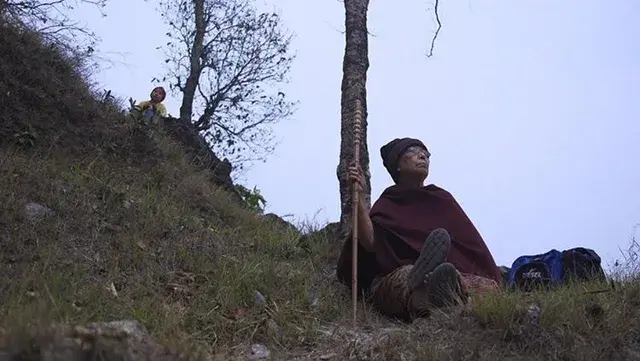Invitation follows Tashi, a ten-year-old living with his grandmother as a tenant of a rich family
in a village near Darjeeling. The family suspects that the grandmother and Tashi are stealing
from their farm which they are supposed to take care of. The story follows these two families in
the lead up to a wedding at the landowners’ home.
The preparations are made vigorously; the idiosyncratic father is annoyed that he would not be able to have the wedding span multiple days, the mother is busy negotiating between her husband and the son, while the latter simply can't be done with it. A lot of time is devoted to the invitations they write to their acquaintances, meticulously remembering people from other villages.
Tashi is more fond of mountains and farms than his home. He often runs away for the whole day, while the grandmother, on the other hand, likes to beat on a steel plate, as if to drown out the abject silence in her life. The family itself has its oddities (gunshots are fired everyday).
The film is slow to come to a boil, and takes its time with the characters. First half is shot in a way that can be described as sitting back, and looking from a vantage point as sequence after sequence plays out, along with enough breathing space to contemplate and make inferences.
The plot, however, is too thin for a runtime of eighty-five minutes. Not a lot is explored in the relationship between Tashi and his grandmother, or in their landlords’ family. The conflict itself arrives slowly. Often, the events shown diligently never lead to much payoff. The filmmaker’s design seems to be one of minimal plot. The film is more interested in the people and their behaviours. However, that too falls apart because of the setting of the film.
Set in a wedding, it often only goes into the farcical, and remains on the surface. Some brilliant sequences like a conversation between the bride and the groom aside, the film remains a little too subtle to allow exploration, and a little too plotless for any real conflict to set in. Films like this are supposed to be slow and contemplative, but an effective one contains loaded images and events, even if disjointed.
Written by Nimish K Sharma
The preparations are made vigorously; the idiosyncratic father is annoyed that he would not be able to have the wedding span multiple days, the mother is busy negotiating between her husband and the son, while the latter simply can't be done with it. A lot of time is devoted to the invitations they write to their acquaintances, meticulously remembering people from other villages.
Tashi is more fond of mountains and farms than his home. He often runs away for the whole day, while the grandmother, on the other hand, likes to beat on a steel plate, as if to drown out the abject silence in her life. The family itself has its oddities (gunshots are fired everyday).
Early on, we see a sequence where Tashi goes to the landowners’ house to watch TV, only to be teased and annoyed by the father. This sets the tone of the relationship between the two families - strictly contractual, with a clear class divide.
However, at the same time, the mother is more sympathetic towards Tashi, shown in little acts like looking for him when he is not back till sunset.The film is slow to come to a boil, and takes its time with the characters. First half is shot in a way that can be described as sitting back, and looking from a vantage point as sequence after sequence plays out, along with enough breathing space to contemplate and make inferences.
The plot, however, is too thin for a runtime of eighty-five minutes. Not a lot is explored in the relationship between Tashi and his grandmother, or in their landlords’ family. The conflict itself arrives slowly. Often, the events shown diligently never lead to much payoff. The filmmaker’s design seems to be one of minimal plot. The film is more interested in the people and their behaviours. However, that too falls apart because of the setting of the film.
Set in a wedding, it often only goes into the farcical, and remains on the surface. Some brilliant sequences like a conversation between the bride and the groom aside, the film remains a little too subtle to allow exploration, and a little too plotless for any real conflict to set in. Films like this are supposed to be slow and contemplative, but an effective one contains loaded images and events, even if disjointed.
There are motifs that show great promise, and there are moments of cinematic brilliance. The director Saurav Rai never really falters, except with his pacing. That might just be enough to make Invitation a lesser film than it could have been.
The film wanders too far for too long, and ultimately when the resolution comes (which could have been interesting, if the premise is anything to go by) it has lost its power.Written by Nimish K Sharma


